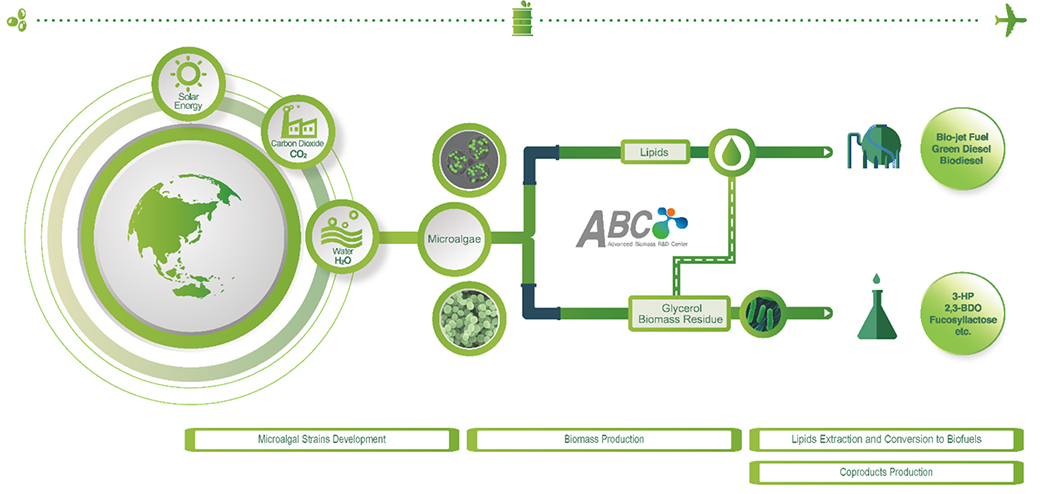
Yong Keun Chang, PhD
Director, Advanced Biomass R&D Center
Professor, Department of Chemical and Biomolecular Engineering, KAIST
Intensive human civilization over the last century has led to the overexploitation of fossil resources like petroleum causing serious environmental problems including global warming with detrimental consequences. This raised the necessity to develop new renewable resources with no greenhouse gas emission for the production of fuels and chemicals. Among various alternatives, microalgal biomass is considered most promising, due to its high productivity per unit area of land and negligible impacts on the human food supply and forest denudation on the contrary to other types of biomass. However, extensive researches are still required to develop cutting-edge technologies and to discover breakthroughs for the production of fuel and chemicals from microalgae, that is, microalgae-based biorefinery.
Advanced Biomass R&D Center (ABC) was founded in 2010 for promoting the development of microalgal biorefinery technologies with an unprecedented scale of financial support (approximately USD $100 million in total for nine years) from the Korean Ministry of Science, ICT and Future Planning (MSIP). ABC is one of the 10 centers over various research areas supported by Global Frontier Project Program of MSIP. More than 25 research groups with diverse specialties encompassing phycology, molecular biology, chemistry, and chemical engineering are participating in ABC. In order to best utilize microalgal biomass for the production of biofuels and biomaterials even to a commercial level, new microalgal strains with desirable characteristics and energy-efficient technologies for mass cultivation, harvesting, and conversion are being intensively developed.
The research areas of ABC can be broadly classified into 4 categories below:
- Microalgal strains development: ABC targets eco-friendly development of highly efficient microalgae which are capable of rapid growth with desirable phenotypes for biofuels production such as high oil content. In addition, the composition of biomass should be ideal for the conversion into biochemicals.
- Biomass production: The second category is to develop innovative biomass production systems, which should allow obtaining massive biomass efficiently. Also, biomass harvesting is included in this category.
- Lipids extraction and conversion to biofuels: The third category is to develop breakthrough technologies for the extraction of lipids from biomass and their conversion into biofuels such as bio-jet oil and biodiesel through heterogeneous catalysis and transesterification.
- Coproducts production: The fourth category is to develop high value-added or useful products and the necessary processes for their production from lipid-free residual biomass and glycerol, a byproduct from biodiesel production. These valuable coproducts include 3-hydroxypropionate, fucose, fucosyllactose, and 2,3-butanediol.
ABC has an ambitious vision of becoming the global leader in the area of microalgae-based biorefinery by 2019. ABC has been producing a number of quality achievements: 707 journal papers (international: 640, domestic: 67); 540 patents (international: 118, domestic: 422); and 17 technology transfers.





